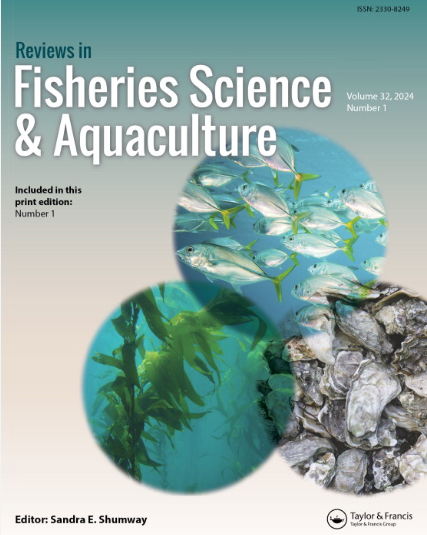气候变率和变化下鱿鱼种群动态的生态渔业预测:综述、挑战和建议
IF 6.4
1区 农林科学
Q1 FISHERIES
引用次数: 13
摘要
摘要在全球范围内,头足类动物支持大型工业规模渔业和小规模到部分大规模的当地个体渔业。从1950年到2014年,它们在全球的着陆量迅速增加,这证明了它们在经济上的重要性越来越大。头足类对环境变化和气候变化很敏感,即使不是所有物种,也有许多物种的丰度波动很大。这在浅海鱿鱼中最为明显,因为它们的生命周期与随着气候变化而变化的边界流有关。由于渔业的“繁荣或萧条”性质,捕捞量的年际变化给渔民和管理者带来了挑战。鱿鱼渔业合理管理的一个关键障碍是渔业预测的发展水平低。尽管在将鱿鱼种群动态与环境变异和变化联系起来方面取得了重大进展,但在开发预测产品以支持鱿鱼渔业管理方面仍然存在一些挑战。理想情况下,鱿鱼渔业管理需要一个包括所有预测时间尺度的预测系统,尤其是中短期预测。本概述首先提供了气候变化和可变性对鱿鱼种群动态的影响、推进生态渔业预测产品的挑战和机遇的当前知识,最后提出了未来开发预测产品的路线图,以支持鱿鱼的可持续渔业管理。至于在鱿鱼渔业管理过程中采用具体的预测方法,重要的是需求、可行性之间的关系,预测的最终成功将取决于最终用户是否使用。本文章由计算机程序翻译,如有差异,请以英文原文为准。
Ecological-Fishery Forecasting of Squid Stock Dynamics under Climate Variability and Change: Review, Challenges, and Recommendations
Abstract Globally, cephalopods support large industrial-scale fisheries and small-scale to partly large-scale local artisanal fisheries. They are of increasing economic importance as evidenced by the rapid rise in their global landings from 1950 to 2014. Cephalopods are sensitive to environmental variability and climate change and many if not all species show wide fluctuations in abundance. This is most evident in ommastrephid nerito-oceanic squid since their life cycle is associated with boundary currents that are changing with climate change. The inter-annual variability in catch presents challenges for fishers and managers due to the ‘boom-or-bust’ nature of the fishery. A key barrier to rational management of squid fisheries is the low level of development of fishery forecasting. Despite substantial progress made in relating squid population dynamics to environmental variability and change, several challenges remain to develop forecast products to support squid fisheries management. Ideally, squid fisheries management needs a forecasting system that includes all time-scales of forecasting, and especially short - and medium-terms forecasts. The present overview first provides current knowledge of the effects of climate change and variability on squid population dynamics, challenges and opportunities to advance ecological-fishery forecast products, and finally a roadmap is proposed for future development of forecasts products to support squid sustainable fisheries management. As for the adoption of specific forecasting methods to the squid fishery management process, what is important is the relationship between needs, feasibility, and the ultimate success of a forecast will be determined by whether it is used by end-users.
求助全文
通过发布文献求助,成功后即可免费获取论文全文。
去求助
来源期刊

Reviews in Fisheries Science & Aquaculture
FISHERIES-
CiteScore
25.20
自引率
0.90%
发文量
19
期刊介绍:
Reviews in Fisheries Science & Aquaculture provides an important forum for the publication of up-to-date reviews covering a broad range of subject areas including management, aquaculture, taxonomy, behavior, stock identification, genetics, nutrition, and physiology. Issues concerning finfish and aquatic invertebrates prized for their economic or recreational importance, their value as indicators of environmental health, or their natural beauty are addressed. An important resource that keeps you apprised of the latest changes in the field, each issue of Reviews in Fisheries Science & Aquaculture presents useful information to fisheries and aquaculture scientists in academia, state and federal natural resources agencies, and the private sector.
 求助内容:
求助内容: 应助结果提醒方式:
应助结果提醒方式:


